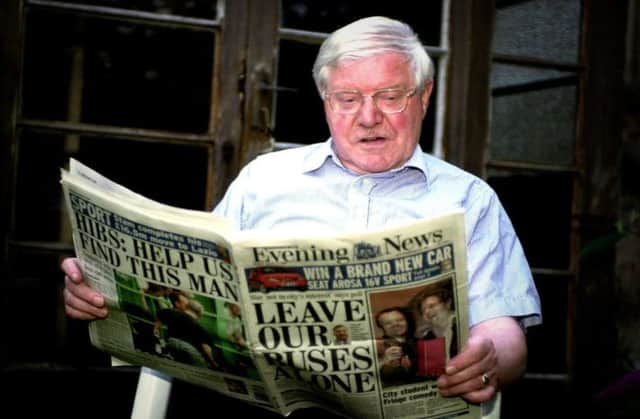Obituary: Bill Rae, journalist


Bill Rae was one of Scotland’s most respected and popular news reporters, spending more than 40 years covering stories of all kinds for the Edinburgh Evening News and then, with three colleagues, setting up the United News agency in 1964 to service the nationals, TV and radio. His reputation for accuracy was legendary and he’d take down a story in immaculate Pitman’s shorthand, writing with his left hand at alarming speed. If assigned to a story, every aspect would be covered, the quotes totally reliable and accompanying photos carefully captioned.
In those days, journalists were trusted by the public and Bill – “Willie” to many of us – maintained the highest standards. He’d get the words into shape in his head before putting them on paper, thinking up a concise headline then hammering the piece out on his typewriter while drawing deeply on a cigarette – he was a 20-a-day man.
Advertisement
Hide AdAdvertisement
Hide AdA senior reporter when I joined as an 18-year-old trainee, “Mr Rae” was often the first to help younger colleagues, perhaps remembering the early days when he freely admitted he’d been “frightened he could not do the work”.
This kindness was confirmed to me just last week by a colleague who’d joined the staff in 1949. Bill was the only reporter I remember relieving us of the wads of copy the “boys” had to phone to the London agencies earning the authors – though not us – large sums in lucrative lineage.
Fortunately, he was among 22 veteran reporters interviewed by Dr Ian MacDougall for Voices of Scottish Journalists published with support from the Scottish Working People’s History Trust last year and his own observations are on public record, revealing his modesty despite vast experience.
Educated at South Morningside Primary and Boroughmuir schools, he joined the News in 1945 as a messenger/copy boy and did national service in the army – “an unmilitary soldier” – from 1946 to 1948.
He had a lifelong interest in cinema and wrote a weekly column, “The Passing Show”, reviewing first run films and theatre productions. This meant he had free press passes to distribute for the city’s main cinemas each week.
However, the crit had to be written that night and he used to complain that while a friend could sit back enjoying the show, “I was already worrying about what I was going to write.”
He had a dry, but not cynical sense of humour. In the days when the News printed local “pars” we received a handwritten note about a postman retiring after many years’ service and describing how he’d been moved from stair deliveries to main doors only.
“Hah,” said Bill reading the paragraph. “He started at the top [of his career] and worked his way down!” Yet he was aware of the responsibility of the job and once told me off when I was taking a story down over the phone and attempted a lighthearted remark while loading fresh typing paper. “I never joke on the phone,” he said.
Advertisement
Hide AdAdvertisement
Hide AdHe covered routine cases in the Burgh Court with its familiar, regular offenders and witnessed the emotional scene in the High Court at the end of murder trials when the judge would hold the black tricorn hat over his own head when delivering a death sentence. He never became blasé about reporting and was struck by what he termed the “ordinariness” of those found guilty of some terrible crimes.
Having produced four editions of the paper daily and two “pink” (ie sports) editions on Saturdays, many editorial staff, dehydrated from fumes from the hot metal foundry and with the smell of the ink still in their lungs, would regularly visit the “Sportsman’s Rendezvous” in Market Street after work. On entry, Bill and his colleagues would be hailed by owner John Baillie with a sarcastic: “Here they come, the intelligentsia of the press.” But they enjoyed a special relationship over the years and were treated more like family than customers.
Bill was an only child and the third generation of his family to work in newspapers, and he lived in or around Morningside most of his life. Not particularly religious, he said the benign influence of the men who ran the 55th BB company in Edinburgh “remained with him” all his life.
In 1963 in Ann Arbor, Michigan, he married Janet Winkelhaus, an American journalist whom he’d first met in the Evening News newsroom – “the luckiest day of my life”.
Jan ran an art gallery at their second home in Yetholm and Bill founded the Yetholm Historical & Archaeological Society, wrote a guide to Yetholm and was editor of two history books published by the society. He also wrote two comedy plays performed by the local theatre group.
Always more at ease with facts, he never joined a political party and claimed to have voted over time for every party except the Communists.
In 1975, he joined the city’s PR and Tourism department as press officer where his expertise, integrity and non-political stance was recognised.
He introduced a unique, weekly “Digest” summarising council committee business, when such details were no longer reported in the press, wrote the city’s Official Guide and was invited to write a revised version after his retirement in 1993. At 84, he wrote a “memoir” of pen-portraits – famous and infamous individuals he’d encountered during his long newspaper career.
Advertisement
Hide AdAdvertisement
Hide AdBill is survived by Jan, their children Andrew and Emma (now Mrs R Damsky) and two grandchildren Sam, five, and Katie, three. Bill Rae’s funeral will take place at 11am on Tuesday, 26 August at Yetholm Parish Church, Kirk Yetholm, near Kelso.